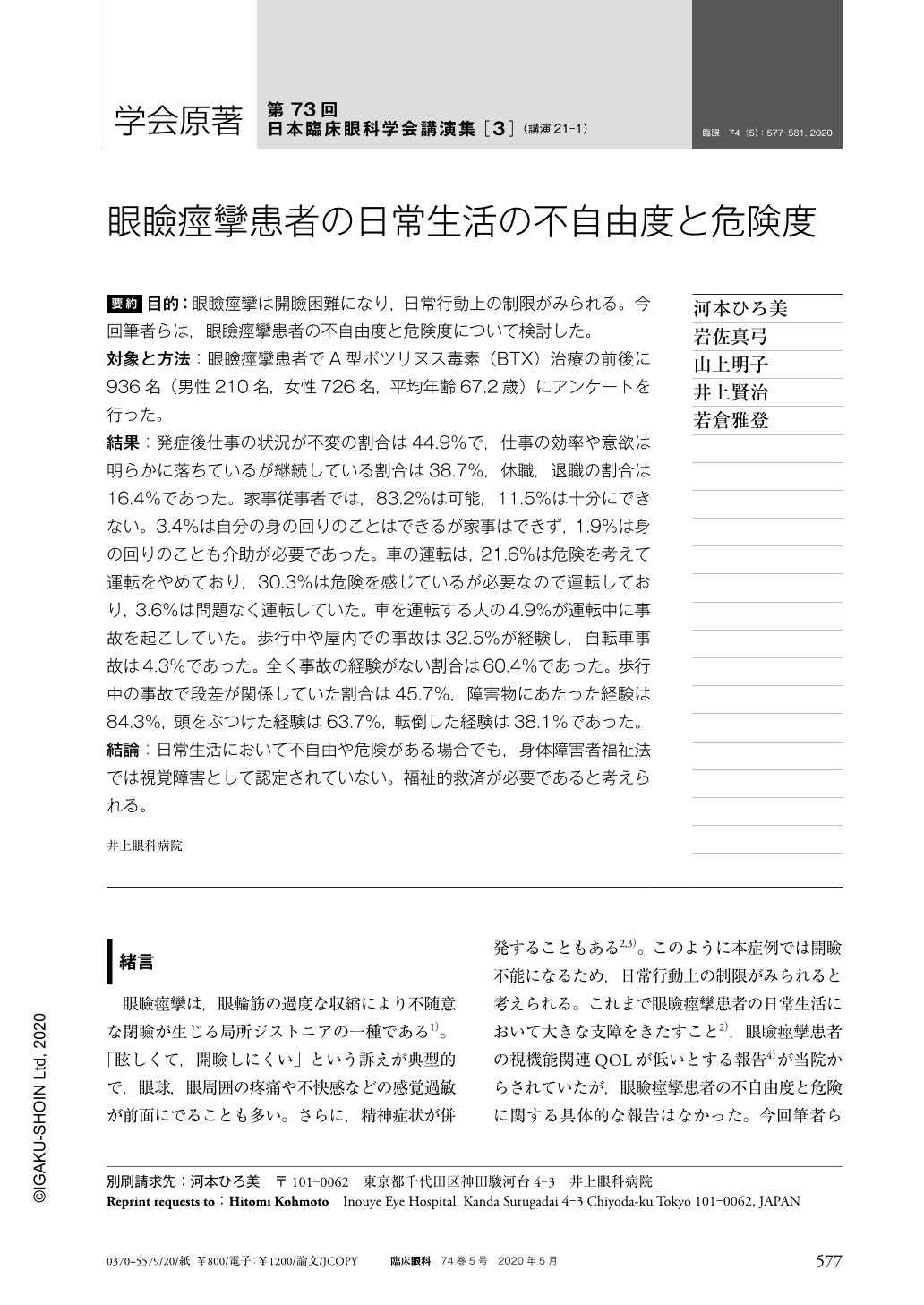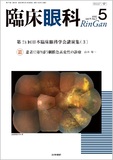Japanese
English
- 有料閲覧
- Abstract 文献概要
- 1ページ目 Look Inside
- 参考文献 Reference
要約 目的:眼瞼痙攣は開瞼困難になり,日常行動上の制限がみられる。今回筆者らは,眼瞼痙攣患者の不自由度と危険度について検討した。
対象と方法:眼瞼痙攣患者でA型ボツリヌス毒素(BTX)治療の前後に936名(男性210名,女性726名,平均年齢67.2歳)にアンケートを行った。
結果:発症後仕事の状況が不変の割合は44.9%で,仕事の効率や意欲は明らかに落ちているが継続している割合は38.7%,休職,退職の割合は16.4%であった。家事従事者では,83.2%は可能,11.5%は十分にできない。3.4%は自分の身の回りのことはできるが家事はできず,1.9%は身の回りのことも介助が必要であった。車の運転は,21.6%は危険を考えて運転をやめており,30.3%は危険を感じているが必要なので運転しており,3.6%は問題なく運転していた。車を運転する人の4.9%が運転中に事故を起こしていた。歩行中や屋内での事故は32.5%が経験し,自転車事故は4.3%であった。全く事故の経験がない割合は60.4%であった。歩行中の事故で段差が関係していた割合は45.7%,障害物にあたった経験は84.3%,頭をぶつけた経験は63.7%,転倒した経験は38.1%であった。
結論:日常生活において不自由や危険がある場合でも,身体障害者福祉法では視覚障害として認定されていない。福祉的救済が必要であると考えられる。
Abstract Purpose:Patients with blepharospasm patients have difficulty in opening their eye, and there are restrictions on activity of daily living. We examined the degree of inconvenience and risk in patients with blepharospasm.
Cases and methods:A questionnaire was handed over to 936 patients(210 males, 726 females, average age 67.2 years old)before and after treatment with botulinum toxin type A for patients with blepharospasm.
Results:The work-related status remained unchanged after the onset was 44.9%, while the efficiency and motivation of work were clearly reduced, but the percentage of continuing work was 38.7%, and the ratio of leave and retirement was 16.4%. For household workers, 83.2% was possible, 11.5% was not enough. 3.4% were able to take care of themselves but not to do housekeeping, and 1.9% needed assistance with personal belongings. As for driving the car, 21.6% stopped driving because of danger, and 30.3% were driving because they felt dangerous but 3.6% were driving without problem. 4.9% of people driving a car had an accident while driving. Accidents while walking or indoors were experienced by 32.5%, and bicycle accidents were 4.3%. The ratio of no accidents was 60.4%. The proportion of steps involved in walking accidents was 45.7%, the experience of hitting obstacles was 84.3%, the experience of hitting the head was 63.7%, and the experience of falling was 38.1%.
Conclusion:Blepharospasm patients have restrictions and risks on daily behavior but Japanese physically disabled persons welfare act does not cover these patients. Welfare is necessary for these patients.

Copyright © 2020, Igaku-Shoin Ltd. All rights reserved.


